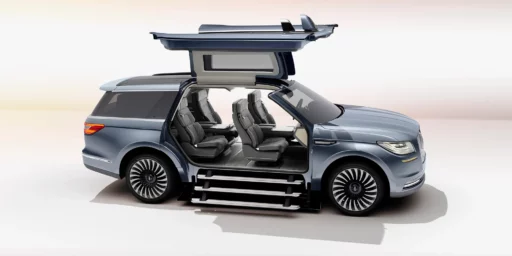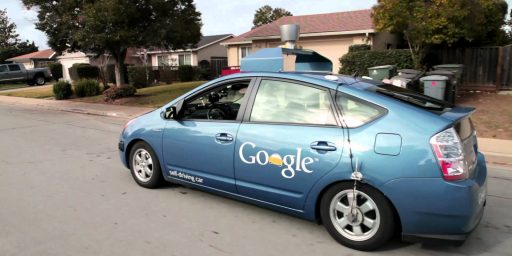Government and Fuel Efficiency
Kevin Drum points to evidence that global demand for oil is soon going to outstrip our capacity to supply it, regardless of anything OPEC does in the short term. He proposes a short-term solution while we figure out a way out of the mess:
How about a deal that trades ANWR drilling for higher CAFE standards, for example? Sounds horrible, doesn’t it? But it might be a politically feasible trade, and in the end the benefit from higher mileage cars probably vastly outweighs the negatives of another pipeline in Alaska. Consider it food for thought.
An interesting idea, although I’m not sure it does all that much in the short term either. Aside from any ideological objections, the advantages of increased CAFE standards would take a while to phase in and it’ll be years before the energy extracted from ANWR exceeded that expended building the extraction infrastructure.. Plus, since people have grown accustomed to more powerful and/or bigger vehicles, it’s unlikely that people will suddenly start buying crappier cars just because GM and Ford start making them. And, of course, there are tradeoffs involved. People driving more fuel efficient cars are more likely to be killed in crashes. Further, anything that increases the cost of new cars creates an incentive to keep the older, less fuel efficient car that one is already driving or the purchase of a used vehicle that’s also less fuel efficient.
If government is going to get deeper into the fuel conservation business, I’d far prefer an approach that incentivizes conservation more directly, such as tax write-offs for the purchase of high fuel economy cars and/or hybrid vehicles; grants for R&D on more fuel efficient engines, and so forth.
For that matter, the government could probably save more energy simply by going to a four day work week for non-emergency personnel. Not only would there be drastic savings in heating, cooling, and other energy use in the buildings that are closed an extra day a week but there would be a massive saving in reducing commutes by 20%. If this were extended to include state and local government agencies, so much the better. It might catch on in the private manufacturing sector as well.






I agree. The left will never buy it because they want higher CAFE standards AND no drilling in ANWR. Our official answer to the dependence on OPEC is “court Russia”.
I didn’t really mean that as a short term solution. As far as I can tell, there really aren’t any short term solutions except just hoping we muddle through without any huge catastrophes.
Rather, it was just an example of a compromise that might be worthwhile for left and right. Nor am I wedded to CAFE, although it was plainly quite effective until Reagan decided to end it. I’m fine with higher gas taxes, subsidies for fuel efficient cars, whatever. How about a law that requires a 5-year estimated gasoline cost prominently displayed on the sticker of a new car? Wouldn’t that be fun?
But the real problem is that no one even cares anymore. Policy seems to be dead. Republicans just want to pander to the oil and coal industries and Democrats just want to engage in quixotic battles that are unwinnable and often trivial. Policy is for wonks, and nobody cares about wonks these days. Hell, I could hardly even bring myself to write that post because I know it’s the kind of tedious and worthy wonkishness that nobody even pretends to care about anymore.
But I imagine the nerds will have their day eventually….
Gotcha.
I’m not even opposed to a government solution to this one, since the market is likely to be too slow in acting. CAFE seems like it creates more problems than it solves, but I can’t think of anything better. I’d prefer to see alternative fuel vehicles that are fun to drive, but don’t have the technical expertise to know how realistic that is and what tradeoffs are entailed.
This one isn’t much fun, though, because there are no obvious, easy solutions. And we can’t even blame the Clintons.
Gas is still, and will continue to be at even higher prices, hardly worth considering in total cost to operate.
The difference between my Hyundai Santa Fe and a Civic is 2 cents per mile in TCO.
When we loan our pick-up for furniture moving, etc. pepole always offer us ‘gas money’. We say “uh-uh, that’ll be 35 cents per mile, thank you” They are always astonished and cannot believe that’s what it really costs to drive a medium sized vehicle.
I agree with you. The government should allow tax write offs for the hybrid vehicles.
I would be more in favor of a flat per barrel tax on oil and the halt of all oil subsidies and let the market do it’s magic. James is right that CAFE only encourages more driving by making it cheaper. The tax money could be used to fund infrastructure investment like upgrades to the power grid, mass transit, and basic research (the kind industry is loath to do).
oh and as for ANWR drilling why are we in such a hurry to “Drain America First”? Leave it there it will be drilled, but now all we will do with it is burn it for very low value uses.
oh and as for ANWR drilling why are we in such a hurry to “Drain America First”? Leave it there it will be drilled, but now all we will do with it is burn it for very low value uses.
This whole CAFE stuff is BS. If the goal is to get people to use less gas then just put a higher tax on gas. Its a no-brainer. In actuality the intention is not to have people consume less gas but to punish them for the sin of using too much gas. If its up to me, I will be filling up high powered sports cars on premium until gas hits 10 bucks a gallon. Environmentalist are more pissed off by my heresy (willfully disrespecting the environment by driving a gas guzzling car) than the actual overall consumption of oil.